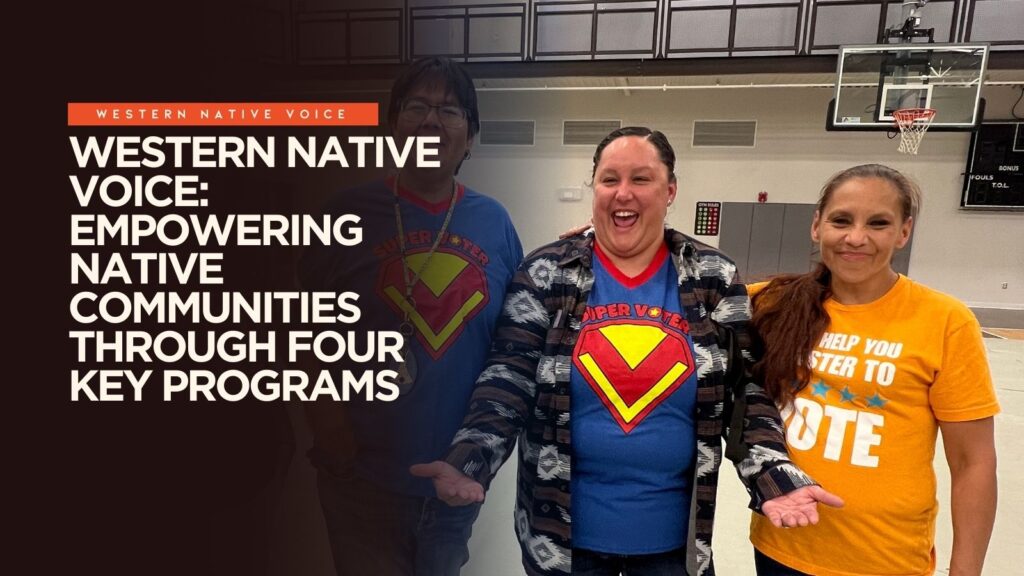
BILLINGS, Mont.—Western Native Voice, a Montana-based nonprofit, has spent 2024 empowering Native communities through its four key programs: Civic Engagement, Civic Education, Leadership Development, and Advocacy. These programs work in unison to strengthen Native communities, amplifying voices and creating pathways for sustainable change.
Civic Engagement: Increasing Participation in Democracy
Civic Engagement remains at the core of Western Native Voice’s mission. In 2024, the organization’s dedicated team traveled across Montana to host events, meetings, and gatherings aimed at empowering voters and highlighting the importance of participating in elections.
The team organized 14 Community Bingos and Voter Outreach Events, creating a familiar and friendly environment to encourage voter participation and registration. The highly successful Snag Dat Vote tour brought the organization to nine Montana communities in just two months, using a mix of ground game strategies, community meetings, and collaborations with Native influencers to emphasize the power of every vote.
Additionally, Western Native Voice held five volunteer trainings, ensuring community members were equipped to support voter outreach efforts in their areas. These actions directly contributed to increased voter engagement and a stronger sense of civic responsibility across Native communities.
Civic Education: Informing and Empowering Voters
Through Civic Education, Western Native Voice ensures that Native voters are informed and prepared to engage in the democratic process. This year, the organization’s efforts included workshops and outreach events designed to break down barriers to voting and explain how local and national policies impact Native communities.
Membership drives also played a vital role in educating community members about the value of civic participation. The team held 24 Membership Events/Drives throughout 2024, reconnecting with communities to build voter awareness and adding 1,120 new members to the organization. A newly established Membership Committee, composed of 15 representatives from Montana’s reservations and urban areas, brought local perspectives and solutions to the forefront. These committee members were equipped with resources and training to amplify civic engagement efforts in their communities.
Leadership Development: Building a Foundation for the Future
Leadership Development is a key component of Western Native Voice’s mission. In 2024, the organization expanded programs aimed at equipping young people and adults with leadership skills to address issues affecting their communities. Programs like Expanding Horizons provided participants with opportunities to engage in workshops on public speaking, advocacy, and community organizing.
By fostering relationships with Native leaders and local organizers, Western Native Voice has created mentorship opportunities that connect generations. These efforts ensure that Native communities will have strong advocates prepared to lead in governance, advocacy, and community-building.
Advocacy: Addressing Systemic Barriers
Advocacy remains at the heart of Western Native Voice’s work. This year, the organization focused on critical issues like protecting voting rights, increasing access to healthcare, and addressing the crisis of Missing and Murdered Indigenous Women (MMIW). Working alongside local and national partners, Western Native Voice has amplified Native perspectives on policies that affect their communities.
At the grassroots level, the organization has supported community-led advocacy efforts, encouraging individuals to speak out on issues that matter most to them. This has included working with elders, youth, and community councils to ensure that the needs of Native communities are represented in decision-making spaces.
Connecting the Four Programs
Western Native Voice’s approach is unique because its programs are interconnected, creating a holistic strategy for community empowerment. For example, voter registration efforts (Civic Engagement) often include workshops to educate participants about ballot measures (Civic Education), while leadership training prepares community members to take on advocacy roles.
The organization’s work this year highlights the power of these combined efforts. By providing tools, education, and leadership opportunities, Western Native Voice ensures that Native communities have the resources to thrive politically, socially, and culturally. Through these programs, the organization continues to strengthen Native voices and create a legacy of empowerment for generations to come.










